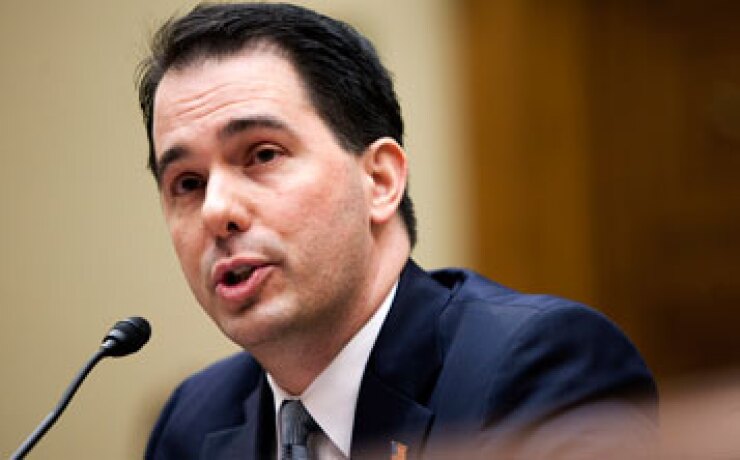
CHICAGO - One day after signing into law a new, two-year $72.7 billion state budget, Wisconsin Gov. Scott Walker on Monday formally launched his bid for the Republican nod in the 2016 presidential contest.
"Wisconsin's fiscal house is in great shape," Walker said in a statement Sunday that accompanied his signing of the budget after making 104 vetoes. "Due to our responsible budgeting, new bonding will be at the lowest level in 20 years. Moody's moved our outlook for the state's credit rating from 'stable' to `positive.' And our total outstanding state debt level has gone down."
The state entered the new fiscal biennium July 1 without a budget amid GOP internal divisions over Walker's proposed borrowing levels, a new Milwaukee Bucks arena, and proposed changes to prevailing wage requirements. The delay did not impact state operations as it does in some other states, like Illinois, as spending can continue at previous levels due to a continuing appropriation.
The logjam was broken by removing the arena from the budget and cutting transportation bond levels.
The budget package advanced by the Joint Finance Committee trims $250 million in funding from the University of Wisconsin system while freezing in-state tuition; K-12 school funding is held steady in fiscal 2016 with a small increase in the second year. Walker had proposed a $300 million cut to the public university system and kindergarten through 12th grade education cuts.
The budget reduces Walker's proposed general fund supported, revenue, and appropriation backed borrowing down to $652 million from $1.6 billion. The drop included the removal of $220 million in appropriation-backed bonding Walker originally proposed for a new Milwaukee Bucks arena. Legislative leaders decided to pull the plan from the budget and let it stand on its own.
The revised package authorizes $850 million of transportation related borrowing with $160 million backed by the state's transportation revenue program, $380 million of transportation funded GO bonds, $132 million of general fund supported GOs, and $175 million of debt with backing still to be determined.
Walker originally sought approval for $1 billion of transportation revenue-backed debt and $330 million of transportation fund-supported GO bonding.
In another borrowing-related measure, the package approved by the Assembly and Senate removed Walker's proposal to pledge 50% of revenues from motor fuel taxes to transportation borrowing, said David Erdman, assistant capital finance director.
Democrats slammed the budget approved last week by the Republican-led majority in the legislature. "Since Republicans took control in 2011, Wisconsin's budget has ballooned by more than $10 billion, yet funding for our schools is down more than $200 per student with more cuts on the way this year," said state Sen. Jennifer Shilling, D-La Crosse. "Investments in our University of Wisconsin schools, our parks, our roads and our communities have been slashed while the special interests who are backing Gov. Walker's presidential campaign have reaped millions in new tax breaks."
Fitch Ratings and Standard & Poor's and Kroll Bond Rating Agency all rate Wisconsin AA and Moody's Investors Service assigns its equivalent Aa2. Moody's has a positive outlook; the others have stable outlook.
A separate vote will be held on the arena, as soon as this week, as supporters work to build rank-and-file support. Under the financing plan, the city, county and state would contribute $250 million toward the new $500 million arena and the team would cover the rest. The total public cost when interest on borrowing is factored in totals about $377 million.
The deal relies on a mix of borrowing and other funding from the state, the city, Milwaukee County, and the Wisconsin Center District, which manages the city's convention center. The team would have to cover overruns and the public funding must be repaid if the team is sold.
The Republican governor has sought to make the case with hesitant lawmakers that the deal preserves state collections of income taxes on visiting NBA teams, economic activity spurred by the team, and eliminates the public expense of maintaining the team's current home.





